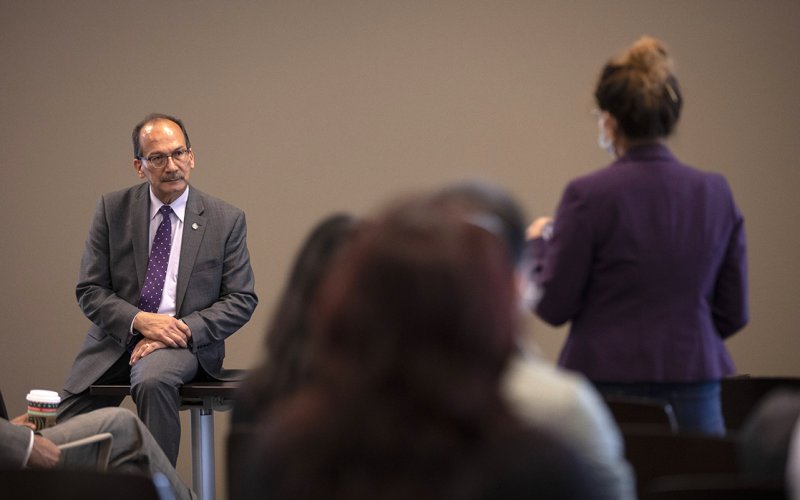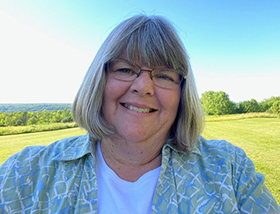The President's Listening and Learning Tour Visits with the School of Ed

ALBANY, N.Y. (Nov. 23, 2021) — President Rodríguez had several compliments and a few concerns in hand when he met with more than 30 faculty and staff members of the School of Education (SOE) on Nov. 9 — the fourth stop in the fifth year of his Listening and Learning Tours.
In the one-hour session, held in the Campus Center Board Room, the president said he wanted to “focus on two critical issues that are of top priority for our institution: enrollment and the signature strengths framework we have developed.”
Enrollment and Revenue
He noted enrollment’s direct bearing upon revenue and the fact that while expenses continue to rise, the University’s enrollment has remained basically stagnant the last 10 years. “Student enrollment is critical to our financial health,” said the President. “Believe me, the demand for additional funds and resources has not diminished — quite the contrary.”
He said the answer would come with developing “a holistic and systemic approach to enrollment that encompasses recruitment, enrollment, retention, persistence and graduation. Toward that end, he said, he has assigned Provost Carol Kim, Student Affairs VP Michael Christakis and Finance VP Todd Foreman to work with UAlbany’s deans “to develop a comprehensive strategic enrollment proposal, with specific initiatives and concrete outcomes.”

Amid institutional enrollment challenges, said Rodríguez, he was “pleased to say the School of Education has done quite well,” increasing its enrollment 22 percent in the past decade, much of it due to its creation of a Human Development academic major, which has grown from 44 students in fall 2016 to 206 this semester.
In the Q&A that followed the president’s remarks, SOE faculty and staff shared perspectives about the challenges and opportunities facing the school relative to enrollment and finances. Rodríguez expressed gratitude for their input and encouraged more.
The president called the Listening and Learning Tours with UAlbany’s schools, colleges and divisions “a great opportunity to meet with our faculty and staff and discuss issues of importance to you and our institution.”
Interim Education Dean Virginia Goatley agreed. “We were pleased to share the School of Education’s efforts surrounding the University’s signature strengths and strategic priorities with President Rodriguez and the executive staff,” she said. “We appreciated the opportunity to talk with them.”
The President noted that enrollment challenges include a need to improve retention and graduation rates and raise the graduate/undergraduate student mix to 30 percent graduate enrollment, from its current 25 percent. Due partly to the fact that for decades, until the creation of the BS in Human Development in 2016, SOE dealt almost exclusively with graduate education, its enrollment is currently 84 percent graduate, with three of the University’s four highest enrolled doctoral programs. The Human Development major has a rising junior graduation rate increase from 72% to 96% over the past six years.
A Part in Signature Strengths
The president then spoke of how, during the past year or so, in consultation with all schools and colleges, his office “has had engaging conversations about our signature strengths and building our research infrastructure.”
He was pleased, he said, to see included in Dean Goatley’s opening remarks that SOE had achieved noteworthy research activity in the past year, such as a $22 million in grant funds from the state to support special education in New York’s schools — a project headed by Associate Professor Kevin Quinn — and a $3.8 million U.S. Department of Education award to optimize student learning in the transition from secondary school to college, headed by Professor Heidi Andrade of Educational & Counseling Psychology (ECP).
The President lauded as well the participation of two SOE faculty, Associate Professor Kristen Wilcox of Educational Policy & Leadership and Alex Pieterse of ECP, in a research collaborative dealing with one of the institution’s signature strengths, health sciences/minority health disparities — the others being emergency preparedness, climate science and public affairs and cybersecurity.
“The School has also collaborated with CEHC on a series of school safety and preparedness summits,” said Rodríguez. “These initiatives are squarely aligned with our signature strengths.”
Goatley pledged SOE’s support. “We recognize the current challenges that face the school and the University and we will continue to advance together,” she said.




